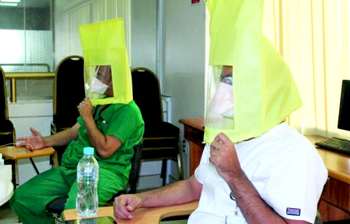Jeddah, Aug 30: Health authorities in Makkah have begun training their personnel, including nurses and doctors, in dealing with prevention of infection of the Middle East Respiratory Syndrome-coronavirus (MERS-CoV) during the Haj season.

He said in a statement that wearing a special mask is crucial, and training is being conducted for nurses and doctors according to international standards at Hera General Hospital in Makkah.
Nearly 3,800 personnel are being provided training in dealing with coronavirus-related cases and preventive measures, the director said, adding that the extensive training that began last week will last for three more weeks.
All doctors and other paramedic staff are being deployed for Haj in Makkah, Noorwali said, and emphasized the importance of effective measures for infection control methods in view of corona and Ebola viruses.
He added that all deployed staff must pass the infection control management tests conducted by the MoH in the holy city.
“The MoH is determined that pilgrims should return to their homes in a safe and healthy state and free from any virus infection during their pilgrimage in the Kingdom,” he said.
In preventing and controlling any suspected Ebola cases, the MoH has made mandatory the spread of information about suspected symptoms to health authorities within 24 hours.
The ministry organized a workshop at Jeddah’s King Fahd Hospital on Thursday in which all provincial directors from the ministry participated through a video link.
In another development, Jeddah’s King Abdulaziz University held a lecture on the coronavirus by a Japanese scientist.
As part of a research program, professor Wataru Kamitani of the Research Institute for Microbial Diseases (RIMD), Osaka University, Japan, was received by professor Adnan Zahed, vice president for Graduate Studies and Scientific Research.
According to university sources, during the visit, Kamitani paid a visit to King Fahd Center for Medical Research to share his expertise with its scientists.
The purpose of the visit, according to Zahed, was to discuss aspects of mutual cooperation in scientific research in line with KAU’s policy of seeking to provide high quality education and taking advantage of the capacity and expertise of other local and foreign universities and scientists.








Comments
Add new comment